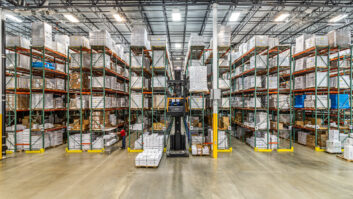The resilience of global supply chains had already fallen significantly for the 12 months prior to the conflict in Ukraine, raising fresh concerns over prolonged material shortages and price rises, according to a new report..
 The Achilles Supply Chain Resilience Index – a time series index measuring changes in supply chain risk – for the period October-December 2021 indicates a score of 44.9 – less than five points higher than the 40% high-risk threshold. It is expected that the score will breach this threshold for the first time by the end of March 2022.
The Achilles Supply Chain Resilience Index – a time series index measuring changes in supply chain risk – for the period October-December 2021 indicates a score of 44.9 – less than five points higher than the 40% high-risk threshold. It is expected that the score will breach this threshold for the first time by the end of March 2022.
The shortage of raw materials such as tin, a key component of circuit boards; molybdenum, a trace mineral used in energy creation, defence products, and new applications powering electric vehicles; and other materials such as nickel, zinc, copper, oil and gas, are expected to impact downstream global supply chains and hamper global trade.
“Supply chain data emerging from Q4 2021 was already indicating that 2022 would be a rocky road for global supply chains, and now with the additional conflict in Ukraine, the outlook is extremely concerning,” commented Katie Tamblin, author of the report and chief product officer at Achilles.
“The Achilles Supply Chain Resilience Index (ASCRI) has, throughout the whole of 2021, flagged commodity prices and energy supply as bellwethers for global supply chains,” she went on. “Pummelled by so many challenges over the last two years, supply chains have not had time to recover, and we now face a critical tipping point that could have both supply and cost ramifications rippling through industrial and consumer markets for years to come. Now is the time to practice the lessons of the pandemic, and as we emerge into a new world order, use data to inform purchasing decisions. Our data shows that to weather this crisis, organisations need visibility across their supply chains to identify vulnerabilities and alternative sources of supply.”
The Achilles Supply Chain Resilience Index (ASCRI) is a time series index measuring changes in supply chain risk. The index measures underlying supply chain resilience by country across six categories: Economic, Environmental, Labour Practices, Legal and Governance, Resilience, and Safety and Security. Each country’s score is derived by combining the Achilles’ Scores of suppliers based in the country with that country’s overall performance in those six categories. This framework is then supplemented by a range of global measures, including shipping and sentiment data
Key findings:
- Further reduction in supply chain resilience score to 44.9 in Q4 2021
- ASCR Index now only marginally above the 40% high-risk threshold
- Shortages for key items will continue to impact downstream supply chains
- Increases in commodity prices continue and significant price volatility expected as a result of the Russia/Ukraine conflict
- Medium-term oil & gas supply constraints continue to impact a range of sectors, and in the current geopolitical climate may fluctuate wildly
- The semi-conductor shortage continues to have a major impact, with a knock-on impact on the transition to green energy as the electric car and renewable energy storage industries compete for a limited supply of lithium as a critical component.







